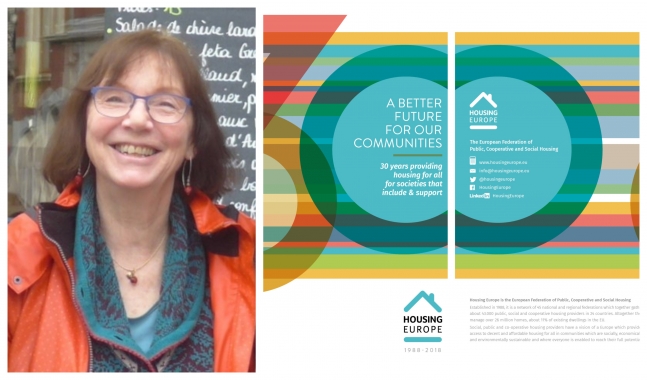CECODHAS Housing Europe through the eyes of Tineke Zuidervaart
Housing Europe turns 30
Brussels, 6 June 2018 | Published in Social
Housing Europe: what does it mean to me Apologies, but I cannot help but still think of [it] as CECODHAS (Comité Européen de Coordination de l’Habitat Social or European Liaison Committee for Social Housing), the European organisation in which I was involved, in a number of capacities including as Executive Secretary, from 1992 until 2012.
It was and still is an organisation where members come together to work on the extremely important issue of housing, and specifically housing for those who cannot secure it on their own through the market.
Indeed, for myself and many others it was a platform where people from all over Europe would come together for meetings, but also for endless lunches and dinners, featuring deep, heavy discussions that would often continue until late at night at the hotel bar! And so, during my time, we, slowly but surely, all came to know, understand and appreciate each others’ views. The North-West-South differences became less important when friendships developed.
In that sense, I am happy to report that, six years after I left the organisation, many friendships still exist and are very important to me!
Memories
It is very difficult to choose just the one - I could easily write a book full of memories.
In fact, my very first meeting was the 1992 Strasbourg Congress. I was a teacher at the time and was asked, through a friend at Nationale Woningraad (one of the two housing federations in the Netherlands), to accompany a group of Dutch housing directors who were participating in the congress.
So after many long presentations on housing, which I had found quite difficult to follow because it was all new to me, it was eventually time for the Q and A.
I’ll never forget how, a man stood up, and began to read aloud, in French, off of what looked like at least 10 typed up pages, lasting what seemed like half an hour or so (and I am hardly exaggerating...) and that was only to ask one question... In later years I came to know him better: Zissis Theos!
CECODHAS had been lobbying for some time to be present at the annual Conference of EU Housing Ministers. If memory serves, we were allowed to attend as observer for the first time in Dresden in 1994. Three years later, in Amsterdam, we organised an exhibition of housing across member states for the Conference.
And then it was in Graz in 1998 that the CECODHAS President was asked to make an official contribution to the Conference itself and this became the custom in years to follow (Kuopio, Paris, Prague, etc.)
So, that first time in 1998, it was myself as Executive Secretary and Andrew Malone who was President, who were invited. We were met at the airport in Graz by an official delegation and our taxi to the hotel then was escorted by motor riders! After the Conference, we all had dinner by candlelight in a old palace... Yeah, such a difficult job...!
Achievements
Representation in Brussels Already in 1992 we were proposing a permanent presence in Brussels. It took years of meetings and discussions but finally, after a decision in 2000, we were very pleased to welcome our lobbyist in Brussels, Claire Roumet. This was a first step, and a short while later she became our General Secretary. This then meant the end of the Permanent Commission, as it was no longer necessary. Its final meeting was in Venice in 2004.
With the permanent presence in Brussels, the function of Executive Secretary was no longer needed, in fact, I was the last person to do this work and then left the role when President Nico van Velzen was succeded by Luc Laurent in Bruges in 2002.
At last, in 2007, the Brussels office was officially opened, a very important step towards achieving continuity and efficiency!
Recognition on a European level Over the years, a great many steps were taken to be recognised as an important player in housing at the European level. Housing was not an official European matter or competence, but instead the responsibility of each member state, however of course there were many indirect links such as building regulations. And so, one major achievement was when we united with other organisations in the European Housing Forum and together managed to ensure that housing was considered at the EU level, for example in relation to Services of General Interest (SGI) in 2006.
Working groups Finally, I cannot leave out the important work done from the early days and onwards, not only in the three main Sections, but also in the thematic working groups. It was a really great, productive way to involve national and local specialists.
To name just a few of the working groups: EU Legislation, Accessible and Adaptable Social Housing, Urban Regeneration, Environment Friendly Building, Social Policies, East and Central Europe, Migrants and Ethnic Minorities, IGLOO, and so on...
To finish, I cannot and must not forget to mention the important role played by the European Housing Observatory, with Laurent Ghekiere!
One particular memory I have, was back in 1994 when the Netherlands instituted a significant change in housing financing, called the “brutering”, where outstanding loans of housing associations were crossed out against future subsidies, a step towards making those organisations more independent from the state. A very technical development and therefore a rather complicated matter to explain, but this was no problem at all for Laurent Ghekiere, simply explaining it to all members in French, “le brutéring...”